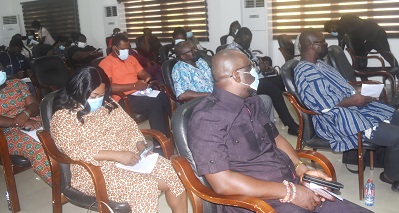
Stakeholders have finalised the drafting of a National Health policy (NHP), expected to deliver holistic, comprehensive, equitable, affordable and responsive health delivery system for Ghanaians.
The formulation of the policy, which was supported by the World Health Organisation (WHO) and Food and Agriculture Organisation (FAO), has gone through consultative processes at the national, regional and district levels.
It was facilitated by multi-sector technical working groups, drawn from at least 20 institutions, which included the National Disaster Management Organisation (NADMO), the Ministry of Health, Ghana Education Service, Ministry of Environment, Science Technology and Innovation and the Ministry of Local Government, Decentralisation and Rural Development.
The policy is expected to strictly mandate some Ministries, Departments and Agencies (MDAs), and other identifiable organisations to work together to enable Ghana achieve a Universal Health Coverage.
These came to lightat press conference, addressed by Director General of National Disaster Management Organisation (NADMO), Nana AgyemangPrempeh, in Accra.
It was to commemorate the International One Health Day, themed “Let’s build a fairer and healthier world for everyone”,expected to be held today, November 3, 2021, at the Animal Health and Production College, Pong-Tamale.
Nana Prempehsaid the event was initiated in 2016, to draw global attention to the need for NHP, through the collaboration of the various sectors in the health delivery system.
He said it was also to increase awareness among policy makers, advocate the adoption of a NHP and provide the policy framework to guide its implementation.
The WHO Representative to Ghana, Dr Francis Chisaka Kasolo, expressed confidence that, a NHP would address the many public health threats, including zoonotic diseases, antibiotic resistance, vector-borne diseases and food safety.
“Indeed, it is documented that about 70 per cent of every known infectious disease. 3 out of every 4 new or emerging infectious diseases in people are spread from animals.
“This implies that there are many shared microbes between animals and human, and their interaction in the eco-system make transmission possible,” he said.
DrKasolo said, globally, close to 60,000 people mainly in Africa and Asia die annually of rabies, an infection, which is almost transmitted from infected dogs.
BY BERNARD BENGHAN & CECILIA LAGBA








